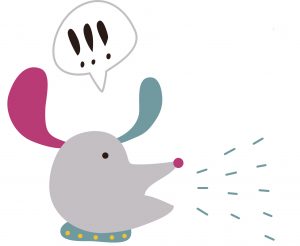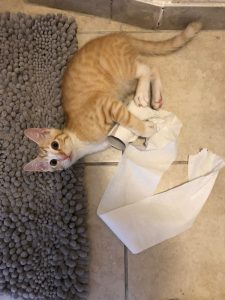Were you brought up to believe that your behavior and personality reflected how well your folks parented? Now that you’re grown, is that how you’re wired? Are you expecting to have a perfect dog – or cat – rabbit – horse? Are you wondering how to deal with dog behavior problems (or cat or rabbit or horse)? You have my permission to let go of that expectation!
It’s a huge burden on people
You worry about what people think. Are they judging you and your animal? Maybe you’re judging, too. Her barking is too loud, he’s too outgoing or too shy. He’s ornery. She’s overweight, he’s too skinny. I’m sure you can come up with your own list.
“Parental” expectations are tough to handle
My parents worried greatly about me because I was incredibly introverted. I’d choose a book or spending time outside over talking to a person any day of the week. Even psychologists thought extroverted people were better adjusted than introverts. They thought introverts were less likely to succeed in life. Introverts, if this resonates, check out The Introvert Advantage: How Quiet People Can Thrive in an Extrovert World.
It’s a burden on our animals, too
When we expect our animals to be perfect, we may shut down an integral part of who they are. When they can’t express their nature and personality, it takes a toll. Think about it from a human perspective – were there behaviors, personality traits, or career paths you shut down or turned from because of your upbringing? Did it affect your life?
Dogs not allowed to bark
My friend and student, Mary Jane connected intuitively to two dogs and learned what they wanted most was “to bark.” One was in London, whom she never met in person. The other she knew all her life. The experiences were several months to a year apart and were quite surprising. Both had blood cancers, probably leukemia.
Louise Hay, who wrote the book, “You Can Heal Your Life,” believed the following thoughts and feelings could lead to lymphomas – a tremendous fear of not being good enough, a frantic race to prove one’s self until the blood has no substance left to support itself; the joy of life is forgotten in the race to find acceptance. Could there be a connection between the dogs’ inability to bark and their leukemia? Maybe.
How to deal with dog behavior problems
Our animals need our love and acceptance for who they are – their personalities, peculiarities, and preferences. So let go of expecting them to act like humans. Where possible and safe, find ways for them to do normal doggy/kitty/horse/gerbil behaviors. And unless you see abusive or neglectful behaviors, cut other humans slack if they’re trying to be good pet people.
- Accept their personalities – Allow them to be themselves even if you hoped for a different personality
- Try dog training – Positive training helps dogs understand how to live with humans so everyone can enjoy each other’s company.
Try animal communication
Peeing and pooping issues
I telepathically ask them to use the litter box or go outside. Then I share how happy their people will be if they started doing that. It can be a win-win because they get more love and we can invite people into our house.
Mouthiness
We can’t expect young dogs not to grab with their mouths. I think we’d be disappointed and angry all the time. But it sure doesn’t work when they grab us. So, give them chew toys and play “tuggie” with them. And, find doggie friends to play with.
Barky dogs

Barky dogs remind me of friends who like to talk. It’s part of who they are. If I call them, I make sure I have time. Barking’s not exactly the same thing, I know. But it does seem to be a personality trait, a way of communicating that’s more important for some dogs than others. Truthfully, humans don’t delight in the sound.
Stella, my barky dog and I are working on a compromise on her barking. At my request, she only uses her ear-splitting barks when someone comes to the door. The regular, “Hey, there’s someone in the neighborhood” or “Hey, there’s a dog” barks are not so loud.
I try not to yell as much at her. I look for ways to make it more fun. So as I cover my ears, I say dramatically, “Ow! Ow! You’re hurting my ears, kid! Please stop!” Or I run to the window and say, “Well, isn’t that an interesting and cute dog/cat/squirrel/person. I see him/her, no need to bark anymore, Stella.” And I pet her. It’s not perfect but it doesn’t bother me as much so she’s living with fewer negative vibes.
Indoor cats
Indoor cats don’t get to hunt prey, but it’s still part of their make-up. Maybe that’s why they sometimes hunt each other. I intuitively got that as one of the issues with my cat, Bunnie when she messes with Shadow.
Now I’m playing more with my cats Mac, Bunnie, and Shadow. I toss balls dangle furry things above their heads so they can stalk and capture their prey. I’ve told them we’ll play when my husband’s walking the dogs. They like it! Mac even comes to me with a ball now to let me know it’s play time.
Embrace imperfection!

Yes, we need house rules and good behavior in humans and animals.
But let’s also allow our animals’ personalities to shine for us.
Let’s look for ways to make our lives together joyful.


Great advice and insights Maribeth!
Judy, I’m so glad you think so, appreciate your comment!
Great information, MB! I love the fact that Mac will bring you a ball to play. I don’t know too many cats who will do that!
He is so endearing when he does this!
I love how you react to Stella’s barking. It’s hard to retrain our brains to respond in a positive manner, the negative comes so much more easily. This response shows acknowledgement of her reason for barking and love for her.
Thanks for your comment, Deb! We absolutely have a more positive relationship now.